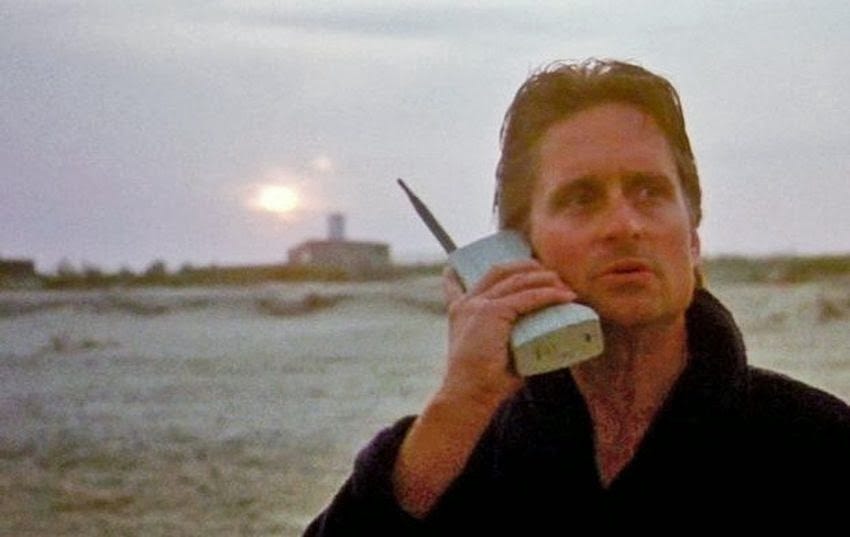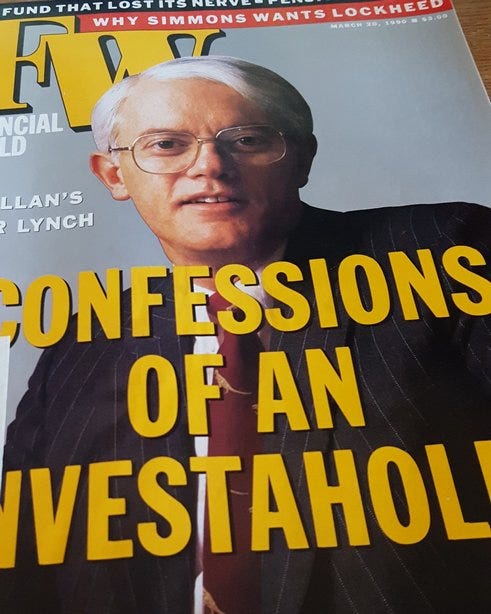📰 Peter Lynch: Confessions of an Investaholic (1990)
"My transmission has two gears — overdrive and off. No in-between."
“This is your wake up call, pal. Go to work!” — Gordon Gekko
Hello everyone,
This is what it sounded like when America’s best stock picker was about to hand in his resignation:
“You think I enjoy coming in here on Saturday mornings? Don’t you think I’d rather be playing with my kids or doing something with my wife?” Silence falls for a minute.
In March 1990, Financial World visited legendary Fidelity fund manager Peter Lynch at his office in Boston. Lynch’s track record was pristine. His Magellan fund was up 2,345% since he Lynch had taken it over in 1977. Its assets had exploded from $22 million to over $12.5 billion. According to the magazine, he’d never had a down year.
Lynch was deeply committed to his investors (“I enjoy the fact that I have a million shareholders—these are people who $5,000 means a lot to — who made some money.”) and to his own goal of beating the market by 4-5% every year. That’s a wild number even with a small amount of money, let alone with one of the country’s largest mutual funds. Along the way, he’d proven plenty of doubters wrong. But now the size of the fund was preventing him from being nimble and picking up his favorite growing small caps. And his shareholder’s expectations were out of line with reality. “If they think Magellan is going to be up 30% a year in the next 10 years, or five,” he commented, “they ought to take a course in magic.”
At the time of the interview, Lynch was clearly exhausted, irritable, and burned out. He was torn between the commitment he felt to his investors and the toll his work was taking on his life. “He's torn by two things,” a colleague commented, “to be the best in the world and having enough time.”
Someone had suggested Lynch was taking it easier as he’d recently taken a vacation with his family. Lynch was triggered when he heard about this. And hence his profile starts with an outburst:
I haven’t gone to a football game in four years. I haven’t gone to a hockey game in six years. I haven’t gone to a Celtics game in five years. I think I read one book in one year. I don’t even read the newspaper.
I’ve worked every Saturday for seven or eight years — I mean seven in the morning. In the last six months I’ve started working some Sunday mornings at home. Three weeks in a row I worked 82 hours…
Lynch had not set out to see his entire life consumed by his fund. It was a result of his deeply competitive nature and his remarkable success. As assets increased, the difficulty of sustaining his outperformance ratcheted up exponentially. Lynch, already a believer that the hardest-working investors find the most ideas, tried to find an even higher gear.
“My transmission has two gears,” he explained, “overdrive and off. No in-between.” But he’d been in overdrive for too long. The only way to win was to step off the treadmill.
Wall Street’s Gordon Gekko telling Bud Fox that it’s ‘time to go to work’ is a call to adventure. It’s Bud’s chance to make a fortune and rise to the top. Peter Lynch received this call from his portfolio, every day. And the better he performed, the earlier the phone rang. That year, he stopped answering. Lynch realized it was possible to overdose on something that started out as a passion. It’s a reminder that this can happen to all of us.
This is your wake-up call. Don’t let your work take over your life to such an extent, and for a sustained period of time, that you risk losing both longevity in your career and everything that you missed out on, including lost family time you can never get back.
When the phone rings, it’s up to us to decide whether it is, in fact, time to go to work or whether we need to take a walk with our loved ones.
Thank you for reading,
Frederik
I’m sharing my takeaways from the article and the full text with subscribers below.
Six takeaways from the article:
Lynch was insanely competitive. “Vacations are a disaster! The fundamentals are changing. … It’s very difficult when you get away for a week, week and a half.”
Lynch’s style of stock picking turned into a grind. “It’s all turning over rocks. If you turn over enough rocks, you’ll find enough stocks.”
Lynch took tons of meetings and invested heavily in his rolodex. “He would not only visit top management, he would take field trips visiting operators. He'd get everyone's name.”
Lynch was a flexible investment agnostic. “You name the hot sector, or segment, he was there. Always, he had better picks than his peers.”
Lynch kept it (deceptively?) simple. “Know what you own, and be able to explain it to a 12-year-old in a minute.”
“Greenspan can’t predict interest rates and he can affect them for three months,” he says.
Lynch had conviction: “Leveraged to the eyeballs.”
Keep reading with a 7-day free trial
Subscribe to Frederik's Age of Alchemy to keep reading this post and get 7 days of free access to the full post archives.





